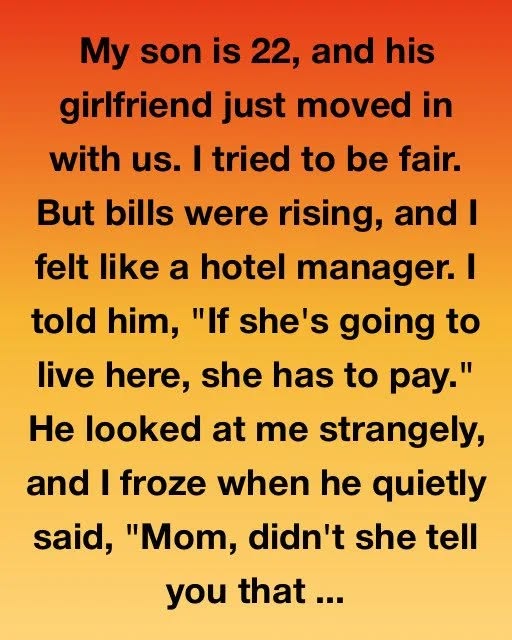They say you never truly understand someone’s heart until life tests them. I learned that the day my son’s girlfriend moved into our home.
My son is twenty-two, thoughtful, steady, and responsible. When he asked if his girlfriend could stay with us “for a little while,” I didn’t question it. Young adults often go through housing changes, and I wanted to support him.
But as weeks turned into months, I started to feel the weight of extra expenses and shared space. Groceries ran out faster, the lights stayed on longer, and the house felt a little more crowded. I began to wonder if I was being taken for granted.
One afternoon, while I was doing dishes, I finally said what had been on my mind.
“If she’s going to live here, she should contribute a little.”
My son didn’t get upset. He just looked at me quietly and said,
“Mom… she didn’t tell you she has nowhere else to go?”
I froze. “No,” I said softly.
He didn’t argue. He simply nodded and walked away. That silence stayed with me.
That evening, I asked her to talk. She opened the door carefully, as if she expected bad news. We sat down in the kitchen, and I asked her gently if it was true that she didn’t have a place to live.
She took a breath and told me everything. Losing her mother. Friends who helped for a while but eventually couldn’t. Nights spent in her car. All the jobs she tried to juggle just to stay afloat. She shared it quietly, as if she was apologizing for it.
She was only nineteen, carrying so much on her shoulders.
And there I was, worried about utility bills.
I reached for her hand and told her she wasn’t a burden. Not here.
From that day on, I noticed things I hadn’t before—her kindness, her gratitude, her willingness to help. She cleaned without being asked, ran errands, took care of the dog, and always said thank you, even for simple things. She told me she once dreamed of going to nursing school, but life had made survival her priority.
Three months later, she walked into the kitchen with a smile and shaking hands.
“I got a job,” she said. “Full-time. And I’m applying for night classes.”
I hugged her. Not because she found work, but because I knew how much strength it took for her to get there.
She began helping with groceries when she could and insisted on paying one bill. I let her take the water bill—small, but meaningful.
Then one day, I found an envelope in the attic. It was marked in my late husband’s handwriting:
“For when we’re gone.”
Inside was a letter and a check for fifteen thousand dollars. The letter explained that years ago, someone had helped us when we needed it most. He wanted us to pass that kindness forward one day.
Continue reading on the next page…

